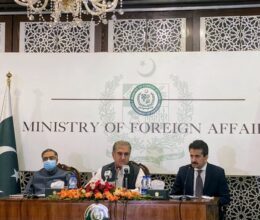Modi claim on Kashmir entirely vague, against Kashmiris’s interest: FM

Islamabad: Foreign Minister Shah Mahmood Qureshi on Friday said as Kashmiris wanted a full-fledged restoration of statehood of Jammu and Kashmir, the claim of Indian prime minister Narendra Modi to fulfill such demand “at some opportune time” was entirely “vague and against the interest of Kashmiris”.
He termed the meeting between Indian prime minister Narendra Modi with Kashmiri leader minus the All Parties Hurriyat Conference a “staged drama and a public relation exercise” to cover the illegal acts of August 5.
“This was a failed attempt on part of the Indian prime minister to mend the tarnished image of his government following the illegal acts of revocation of special status of Jammu and Kashmir,” the foreign minister said here at a press conference.
The foreign minister was referring to Thursday’s meeting where Narendra Modi met political figures from Occupied Jammu and Kashmir – the first high-level engagement since August 2019 when India revoked the region’s autonomy by scrapping Article 370 of its constitution and ended the special status of J&K.
He said the all-parties conference called by the Indian prime minister exposed the tall claims about normalcy of the situation in Jammu and Kashmir ended up in failure.
He said there existed a wide gulf between the aspirations of Bhartiya Janta Party government and the true representative of Kashmiris who remained “in search of their identity and the basic right of self-determination.
Qureshi said the last two years in J&K were all about the “siege of Kashmiri people” with routine incidents of extrajudicial killings, illegal detentions and abductions.
“India has exercised all tools of State oppression to curb the determination of Kashmiris, however it has failed to subjugate them,” he said.
He mentioned that India’s illegal act resulted in economic loss with 50 percent of industries closed in the valley.
To a question on India bringing demographic change in J&K, he said since the step would have far-reaching implications, Pakistan had highlighted the matter at highest fora including United Nations General Assembly, UN Security Council, during bilateral interactions of at the levels of prime minister and foreign minister, through parliamentary engagement and Geneva Council of Human Rights.
Foreign Minister Qureshi, in response to a question on Prime Minister Imran Khan’s statement that nuclear capability would serve no purpose with resolution of the Kashmir dispute, said the country’s nuclear policy had “no aggressive designs”.
He, however, said that keeping the nuclear deterrent was in view of neighbouring countries which could have belligerent motives.
“Such decision [nuclear disarmament] is dependent on several factors including the security environment, outstanding disputes and balance of force,” he said.
Asked if Pakistan and India were holding a backdoor channel of communication, he categorically dismissed the notion, however said there existed a “time to time interaction at intelligence level in the area of regional security”.
To a question on rising violence in Afghanistan, he said Pakistan was concerned about the situation where several elements and “spoilers” could be held responsible who did not want to see peace and stability in Afghanistan.
He said Pakistan had been advocating and facilitating the Afghan peace process with its role of “becoming a part of solution and not problem”.
“A negotiated political settlement in Afghanistan is in everybody’s Interest and the best way forward,” he said.
Qureshi emphasized that the Afghans, including the government and Taliban, needed to sit together.
“Whatever the outcome evolves out of their negotiations, Pakistan would respect that,” he added, saying that “We will remain the partners of peace and not conflict”.
Asked about the blame-game against Pakistan ahead of the meeting between U.S. president Joe Biden and Afghan president Ashraf Ghani, he said, “They [Afghan government representatives] can say whatever they want, but the U.S. knows Pakistan’s role very well and the world is oblivious to our role”.
The foreign minister said the peace and stability in Afghanistan would ensure development and regional connectivity. However in case of a setback, Afghans would suffer the most, he added.





